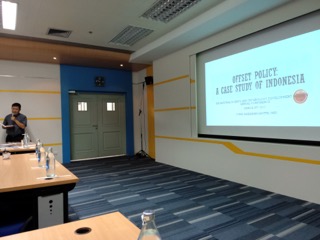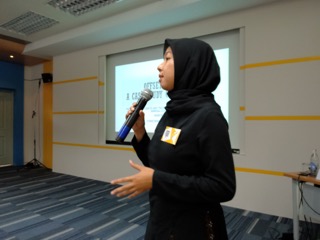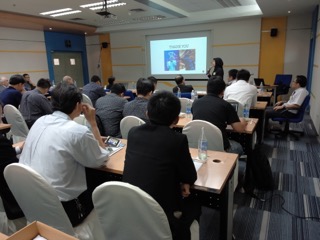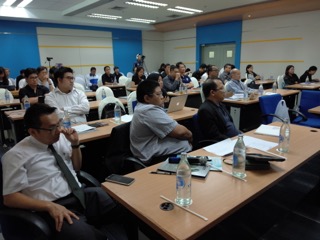IR Binus Faculty Member: Offset Makes Positive Contribution to Strategic Industrialization
On Friday, March 31, 2017, one of the Faculty Members of the Department of International Relations of Bina Nusantara University, Curie Maharani Savitri, Ph.D., was invited as one of the speakers in the academic seminar during the annual conference of the National Science and Technology Development Agency (NSTDA) of Thailand Ministry of Science and Technology, in Thailand Science Park Convention Center, northern Bangkok.
As a scholar who researches on industrial collaboration and offset, as well as a member of the working Group on strategic and high-tech industry at the National Committee for Economy and Industry (KEIN) of the Republic of Indonesia, Curie was invited to speak on the topic of “Offset Policy: A Case Study of Indonesia” in a seminar session of “The Future of Thai Rail Industry: Opportunities and Challenges in Development Through Industrial Collaboration Strategy”. Offset is an arrangement between the government and foreign arms suppliers to return some value of the contract to the buyer’s country, in this case the Republic of Indonesia, as one of the requirements of arms trade.
In her presentation, Curie explained that Indonesia is hailed as the pioneer of direct offset in Southeast Asia region, and the first major country outside of Eastern Europe to adopt a counter-trade policy. Given its status as a latecomer, the country sought technological progress since 1970s to expedite the process of industrialization. Offsets have been applied to both commercial and defense procurement and channeled to strategic industries, with a dual-use portfolio, particularly in the aerospace and shipbuilding sectors. The country has seen the emergence, disappearance, and reappearance of offset during the course of strategic industrialization in the 1980s, the economic crisis in the late 1990s, and during the defense industrial revitalization program in the 21st Century.
Curie also explained the lessons learned from Indonesian offset in 1980s-2010. First, offset does make a positive contribution to strategic industrialization, although its significance varies from one industrial sector to another and across different offset periods. Second, in general, areas in which offset contribution have been felt are skills enhancement and technology transfer. However, offset’s contribution has been minimal in employment-generation, the creation of local supply chains, and export, with no impact at all on the promotion of local R&D capability.
According to Curie, the main factors behind the failure of offset include (1) inconsistent implementation of offset as a government procurement policy tool; (2) the absence of a common agreement on what is to be achieved by offset, in other words, ‘strategic objectives’; (3) the need for more adaptable approach, i.e. build local capacity on offset management; as well as (4) technology absorbing capacity.
Pada Jumat, 31 Maret 2017, salah seorang Faculty Member Departemen Hubungan Internasional Universitas Bina Nusantara, Curie Maharani Savitri, Ph.D., menjadi salah satu pembicara seminar akademik dalam konferensi tahunan National Science and Technology Development Agency (NSTDA) Kementerian Sains dan Teknologi Thailand, di Thailand Science Park Convention Center, utara Bangkok.
Sebagai akademisi yang meneliti tentang kolaborasi industri dan ofset, juga sebagai anggota kelompok kerja industri strategis dan teknologi tinggi dalam Komite Ekonomi dan Industri Nasional (KEIN) Republik Indonesia, Curie diundang untuk berbicara tentang topik “Offset Policy: A Case Study of Indonesia” dalam sesi seminar bertajuk “The Future of Thai Rail Industry: Opportunities and Challenges in Development Through Industrial Collaboration Strategy“. Ofset adalah pengaturan antara pemerintah dan pemasok senjata dari luar negeri untuk mengembalikan sebagian nilai kontrak kepada negara pembeli, dalam hal ini negara Republik Indonesia, sebagai salah satu persyaratan jual beli.
Dalam paparannya, Curie menjelaskan Indonesia dianggap sebagai pelopor ofset langsung di kawasan Asia Tenggara, dan merupakan negara besar pertama di luar Eropa Timur yang mengadopsi kebijakan imbal dagang dalam pengadaan senjata. Dengan statusnya sebagai latecomer industrialisasi, Indonesia berusaha mencapai kemajuan teknologi sejak 1970-an untuk mempercepat proses industrialisasi. Indonesia kemudian menerapkan ofset dalam pengadaan komersial maupun pertahanan, dan disalurkan ke industri-industri strategis dengan portofolio penggunaan ganda (dual-use), khususnya di sektor kedirgantaraan dan galangan kapal. Di Indonesia, ofset telah muncul selama industrialisasi strategis pada 1980-an, lenyap selama krisis ekonomi di akhir 1990-an, dan muncul kembali selama program revitalisasi industri pertahanan di abad ke-21.
Curie juga memaparkan pelajaran yang dapat dipetik dari ofset tahun 1980-an hingga 2010 di Indonesia. Pertama, ofset memberikan kontribusi positif untuk industrialisasi strategis, meskipun signifikansinya bervariasi dari satu sektor industri ke yang lain dan di berbagai periode yang berbeda. Kedua, secara umum, kontribusi ofset telah dirasakan dalam hal peningkatan keterampilan dan alih teknologi. Namun, kontribusi ofset minim dalam hal penciptaan lapangan pekerjaan, penciptaan rantai pasokan lokal, dan ekspor, serta tidak ada sama sekali dalam hal peningkatan kemampuan penelitian dan pengembangan lokal.
Menurut Curie, faktor-faktor utama kegagalan ofset di Indonesia antara lain karena (1) pelaksanaan yang tidak konsisten sebagai alat kebijakan pengadaan pemerintah; (2) tidak adanya kesepakatan bersama tentang apa yang harus dicapai oleh offset, atau dengan kata lain ‘tujuan strategis’; (3) pendekatan yang kurang mudah diadaptasi, atau dengan kata lain perlu membangun kapasitas lokal pada manajemen ofset; serta (4) kapasitas penyerapan teknologi.







Comments :